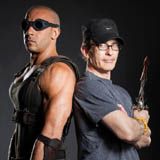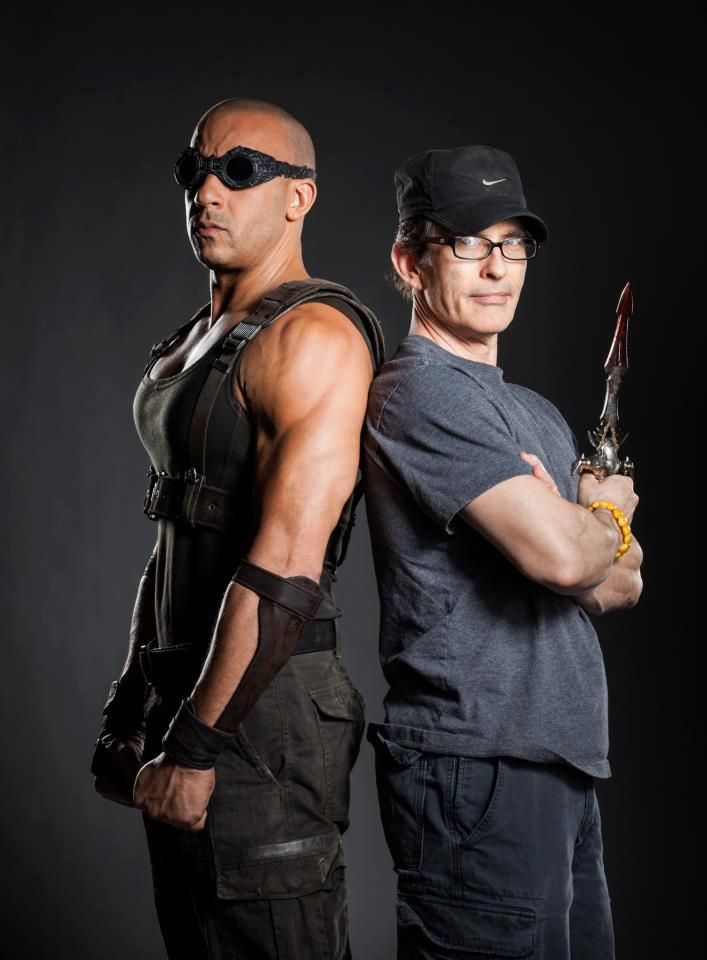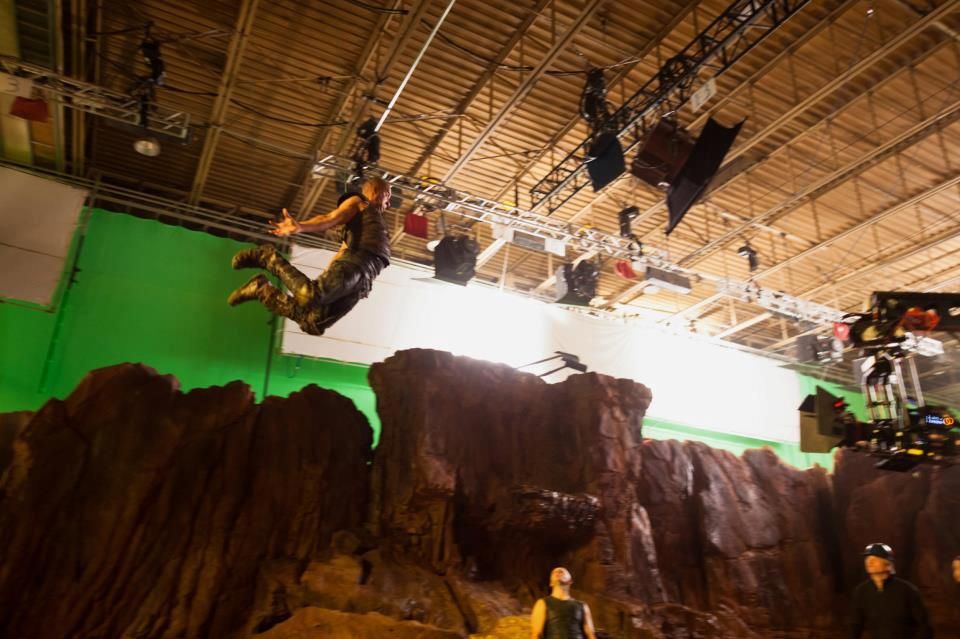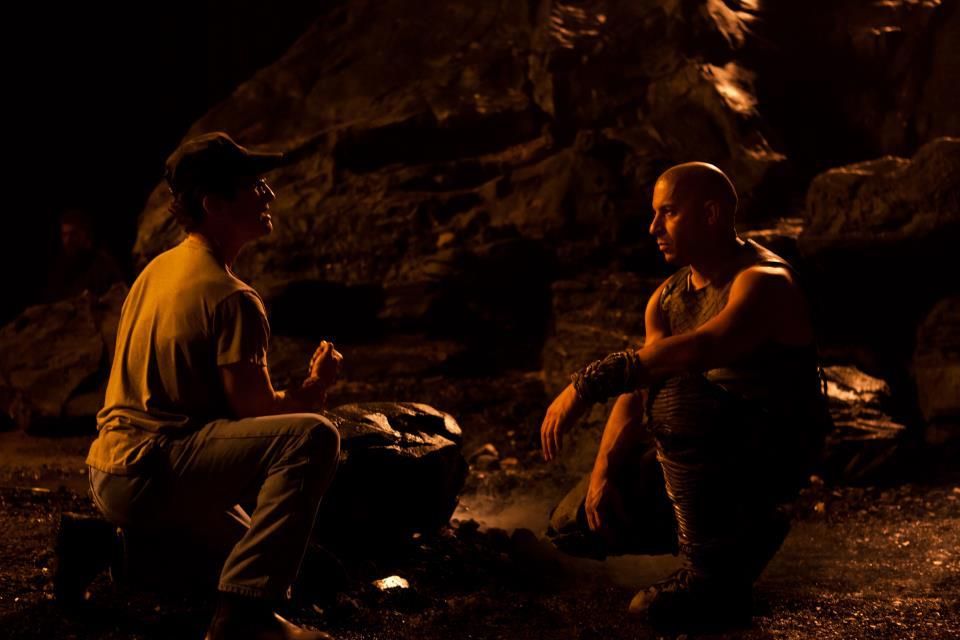Although Vin Diesel has long been the face of the Riddick franchise, David Twohy has been the creative vision. Collaborating closely with his star over the course of now 13 years, Twohy created the vast mythology that captivated audiences in Pitch Black and The Chronicles of Riddick, and he hopes to reconnect with in its latest installment, fittingly titled after its main character. But thanks to the mixed reception of the second film, the writer/director finds himself in the unique position of trying to explore a universe he himself expanded, but without sacrificing the intimacy that earned the franchise a devoted following.
Spinoff Online met with Twohy at the recent Los Angeles press day for Riddick, where the filmmaker discussed the process of reviving the character and his universe in a way that would intrigue newcomers even as it satisfied longtime fans. In addition to discussing the film’s undercurrents of gender politics and spirituality, he offered perspective on the series’ ongoing appeal even as he hinted about not one but two more installments.
Spinoff Online: What was the process of catching the audience up on this, because it’s been just long enough that a lot of people are going to come into Riddick without an intimate knowledge of its mythology?
David Twohy: We still don’t know how much information they’re going to bring to this movie, because even though the last movie was eight or nine years ago, it plays all of the time on TNT and AMC and cable, both of them do. So there’s two schools of thought: They won’t know much, the 18-year-olds, and you’d better make it a standalone movie, versus no, the mythology is out there, and you can do a little inside baseball – you don’t have to lay out too much for them. It’s a good argument and we go back and forth on that ourselves, and we’re just trying to figure that out, but in seeing some early tracking – and I’m not a big numbers guy – there does seem to be a lot of interest in the teen crowd for this movie, much to Universal’s joy at this point.
Vin Diesel Discusses "Riddick," Fandom and the Future of Film
How tough was it to create a new story for this character and this world that still paid homage or referenced the material in the first two films?
Well, this movie was an offshoot of discussions I had with Vin in his kitchen about what does the next one should look like, and we both very much like Jeremiah Johnson and Cast Away, so the first idea was a whole movie like that. But we said, no, I don’t think so (laughs)! I don't think you want to do a whole movie with no other characters on the planet besides Riddick, because he needs people to play off of. He needs people to be fearful of him, and it can’t just be a simple survival story. But for an act, that’s intriguing. So let me start there, and for the fans of Pitch Black, let me bring forward this Boss Johns character to tie up or tie into that story. But I think this one feels more like Pitch Black if only because we’re limited to one world and we have that tie in to one character from Pitch Black.
Riddick seems a little more gregarious in this film. How much growth did you want him to demonstrate from those previous movies?
What part do you think he’s gregarious?
In his interactions with the mercenaries when he’s chained up, he seems a little chattier.
Hm, I hadn’t thought that he was chattier in this than in other movies. But you never want to explain him so much, or have him talk so much that he demystifies himself, because there’s a mystique and that has to be respected about the character. There is an evolution of his character in that he begins the movie as a guy who thinks that maybe he’s lost a step – he’s gotten maybe a little slow, a little fat, and crime of all crimes, maybe he got civilized. And even though he’s been dumped on this world and left for dead, he’s viewing it suddenly as not a dumping ground, but a proving ground – to see if he can get back to the man he was. So that’s an interesting little evolution – can I get the edge back? So that’s why he says, now it’s just me and this no-name world now. We’re zeroing the clock, and I’ll see if I can not only survive, but reign supreme. So that sort of gets us all back up to speed, and if you want to think about it in a broader sense, it could be a parallel for the franchise as well. Because some people say, hey, you guys got big and bloated in the second movie, and now it’s time to get back to basics.
Given that criticism, did you feel like this was an opportunity, or that there was pressure when you came back to create a new installment?
Probably equal parts of both, but the movie itself was shaped by how much financial resources we could bring to bear. We knew it wasn’t going to be a studio movie; Universal told us six or seven years ago that they were out of the Riddick business: “We’re holding onto Fast and Furious, but we’re not going to do Riddick any more because we spent too much money.” And so knowing there was going to be independence, and knowing that we were going to be raising our own money, that kind of dictated what kind of movie it was. So we limited it to one world, it became a survival story, and with a solid tie into Pitch Black. We would bring in the Boss Johns character that introduced a very personal story of a father searching out answers about his dead son, which I like a lot in the movie. I like the interrogation scene between the two of them, with Riddick in chains and Boss Johns [saying], “You’re going to die, so you may just want to come clean for the record.” I liked that a lot.
I didn’t clock the exact time, but there’s a good 30 or 40 minutes where Riddick stops being the direct focus of the movie. What prompted that shift in focus to the mercenaries, and did you think about maybe executing the same story beats from Riddick’s perspective?
Well, no. It wouldn’t have been a real possibility, because […] I’ve got a lot of new characters that I want to introduce, but what I’m also doing is taking Riddick as a sympathetic character and the only guy on the planet on, let’s call it Act One. I don’t pay too much attention to acts these days, but let’s call it Act One. And then in Act Two, as soon as other people arrive and we go into battle mode, he becomes sort of the ghost that he was in Pitch Black, and he’s always lurking – he becomes a menace, a threat that they have to deal with. I wanted to keep him as they saw him, so that we could get new eyes on him for Act Two. And then in Act Three, they have to work together, and we pressurize the situation to see which ones will stand up under the pressure, and which ones will crack. So I just wanted to do three distinct acts where the dynamics were completely different, and that’s again me as an independent filmmaker this time out trying to do different things so that the movie doesn’t feel factory-made, but it doesn’t feel made by a studio, but it has change-up pitches in it, so it feels more handmade than factory-made.
This film is full of competing alpha males, and its themes focus on masculinity and machismo. Is that just a byproduct of making action movies, or is that an idea you specifically wanted to explore?
Hm, well, in Pitch Black there was the question who is the alpha male here – is it the Johns character or the Riddick character? And we kind of got away from that in Chronicles, where we introduced Vaako and our Lady Macbeth behind him, and all of those other interesting things. So it’s not bred into the bone of the series, but it just felt right. When I sit down to write these things, I talk them through with Vin, I get a vibe from him about what he’s feeling, and then I go off and write it. I don’t think about it too much, I don’t outline any more, I just kind of write and let my instincts carry me – and that’s where my personal instincts go. So I don’t know if that’s me and my machismo coming out on the screen, or it’s bred into the bone of sort of action and science fiction. I don’t know. I don’t know the answer to that.
Maybe further along those lines, why then was it important for you to sexualize Dahl? You have a character like Vasquez in Aliens whose sexuality is only passingly addressed, but what made that an important undercurrent in the dynamic between her and the male characters in this world?
Well, remember in Aliens, there’s Vasquez, but she’s part of one team – and here I have two different teams, and two different kinds of teams. So among her team, she’s respected and it’s not an issue, but as soon as she gets around the other team, it becomes an issue, as I think it would if there was one female on this fucking planet. Her sexuality would be an issue.
Well, then how careful do you have to be when depicting a character who professes to be gay and then the movie is, in a way, sort of about her ending up with Riddick?
You think she ends up with Riddick?
Well, there’s clearly an attraction there.
[Laughs.] Just because she went down and saved him, you think so?
And they grabbed each other’s ass, so possibly.
No, he grabbed hers, she didn’t grab his. Um, well, look, there’s a question – and if you interview Katee [Sackhoff], she can give you a little more illumination – but there’s a question of what her sexuality is, whether she says one thing and is another, or she is what she says. Because like the Jack character in Pitch Black, she posed as a boy because she didn’t want the grief – she didn’t want to get hassled as a runaway, as a girl. She didn’t want to have that jeopardy. So in the same way it’s possible that she just tells guys, forget it, it’s not about that. I don’t fuck guys anyway. And that may or may not be true.
There’s also a strong undercurrent of spirituality in the movie. Is that something you were interested in exploring, or did you feel like that was a good thing to juxtapose with the brutality of the rest of the universe?
It is always that, but what parts were you thinking about?
Certainly you have a character who regularly talks about his faith, but Riddick talks about a kind of spirituality towards the beginning of the movie.
It probably represents my interest in religion from just an analytical standpoint, an atheist standpoint, about why people do find the need to create a god only to worship him, and then why people flock to religion as solace or companionship. So I think it just reflects me and trying to understand why people need that in their lives, and recognizing that’s still a big, important part to a lot of people’s lives.
How likely do you feel like this saga is to continue, especially since you went from something small to something more operatic, and back again? Would you expand the mythology again, or stick with stories on this scale?
It’s a damn good question, and one we’re trying to figure out ourselves. Can you actually go from a small, contained movie to a big, operatic one, to a more contained one, back to a big, mythological one, and then we finish up in a five-series franchise with something that is more grounded and contained – and that would be the return to Furya, his homeworld. Can you do that, and just say, let the fans argue it out as to which ones they like? Part of us wants to be that audacious, but at the same time we don’t really want to step in it. Because, really, the question is, can you change genres within the same movie even though you retain the same central character? And if the fans see the pattern there, will they go along for the ride? So that’s what we’re trying to figure out right now. We know where we’re going, so we’re ahead of Lost already (laughs). We know where we end, it’s just the road to that end that we’re figuring out.
In the interim, is this what you’re looking at as your next project, or do you have something else lined up?
There’s something else. I’d love to talk about it but it’s probably about two or three weeks premature, so hopefully once Riddick settles down, we can announce that. But in the same way I’m sure he’s not going to do back-to-back Riddicks, I don’t want to do back-to-back Riddicks either. It just feels like I’ve got other things in me. So like I popped A Perfect Getaway, I liked that movie, just because it was a quick shoot, 40 days, audacious, quirky. But I’m already looking to do something in between.
Riddick opens Friday nationwide.




